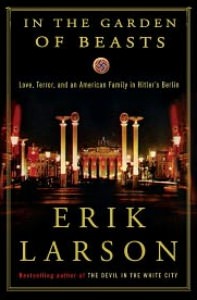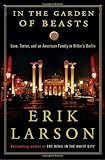Love Among the Beasts
Reviewing Erik Larson's "In the Garden of Beasts: Love, Terror, and an American Family in Hitler's Berlin," the author makes his case for "one good thing about the Nazis" and wagers that this romantic thriller of a memoir will hit it bigThe great thing about the Nazis Hmm No, that isn't going to work, for all the obvious reasons.
This review is from a syndication service of The Washington Post.
The great thing about the Nazis … Hmm. No, that isn’t going to work, for all the obvious reasons. Surely there are no good things about the Nazis, I hear you say.
Well, there is one good thing, and it is this: In an age of moral relativism, we can all agree that the Nazis were evil and that the Western Allied forces opposing the Nazis were good.
With the Nazis you have a proper villain: Adolf Hitler. You have some heinous crimes, and here you can take your pick: the Holocaust, waging aggressive war, etc. You have a story arc that even the dumbest studio exec could understand, with a beginning, a middle and an end, and, gosh, they’re even in that order. You have some unlikely hero figures: Churchill and Roosevelt, but not I think De Gaulle. And, best of all, at the end of the story, the villain is completely destroyed. Everyone — even the long-suffering population of Germany — is glad. Ding-Dong! The witch is dead.
In the Garden of Beasts: Love, Terror, and an American Family in Hitler’s Berlin
By Erik Larson
Crown, 464 pages
Erik Larson, the author of several successful works of popular history like “The Devil in the White City” and “Isaac’s Storm,” has now turned his attention and considerable writing talent to the subject with his latest book, “In the Garden of Beasts.” And to bowdlerize a remark of Doctor Johnson’s, one is not surprised to find it done, but to find it done so well.
“In the Garden of Beasts” at times seems derivative of a 1940 memoir, “Through Embassy Eyes,” by Martha Dodd, one of the main characters of his tale. Much of material is the same, but we can forgive that because Larson fills in everything that Dodd herself felt obliged to leave out: It’s not every U.S. ambassador’s daughter who becomes a spy for the Soviet Union.
We can also forgive Larson because his book reads more like an elegant thriller — and certainly better than the elegant thriller, “Sowing the Wind,” that Dodd wrote herself. I found Larson’s book to be utterly compelling, and while I was reading it there were several occasions on which I had to stop and check to make sure it really was a work of nonfiction. It is — and marvelous stuff. You really couldn’t invent it in a novel because no one would believe you.
“In the Garden of Beasts” is, in the main, the story of George Dodd, a mild-mannered academic from Chicago, who to his own and everyone else’s surprise was appointed by President Roosevelt as America’s man in Nazi Germany. Larson describes Berlin very well, especially before and after the infamous Night of the Long Knives, when, in the stifling summer of 1934, the Fuehrer consolidated his power over Germany with a series of political murders. But for my Reichsmark it’s Martha’s story that’s the most interesting.
|
To see long excerpts from “In the Garden of Beasts” at Google Books, click here. |
Beautiful, intelligent, willful, and highly sexed (a perfect heroine), no sooner had Martha arrived in Berlin than she was conducting affairs with several leading Nazis, including Ernst “Putzi” Hanfstaengl, who at one stage tried to persuade her to become Hitler’s mistress. Repelled by Hitler’s halitosis and his even more revolting Weltanschauung, Martha found herself drawn to a very tall man at the Russian embassy who became her lover, her mentor and, later on, her spy master. British intellectual E.H. Carr, in his famous work of historiography “What is History?”, advised one to study the historian before one begins to study the facts he has assembled. What bees does he have in his bonnet, asks Carr? “When you read a work of history, always listen out for the buzzing.”
Larson is a journalist, not really a historian at all. Nothing wrong with that. And really the only buzz about Larson that should be of interest to anyone is that he’s written an excellent and entertaining book that deserves to be a best-seller and probably will be.
Philip Kerr’s latest novel is “Field Gray.”
(c) 2011, Washington Post Book World Service/Washington Post Writers Group
Your support matters…Independent journalism is under threat and overshadowed by heavily funded mainstream media.
You can help level the playing field. Become a member.
Your tax-deductible contribution keeps us digging beneath the headlines to give you thought-provoking, investigative reporting and analysis that unearths what's really happening- without compromise.
Give today to support our courageous, independent journalists.







You need to be a supporter to comment.
There are currently no responses to this article.
Be the first to respond.